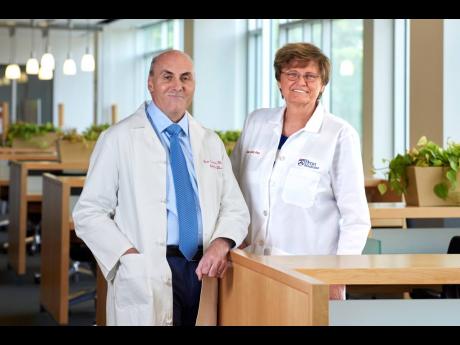Nobel in medicine goes to two scientists whose work enabled creation of mRNA vaccines against COVID-19
STOCKHOLM (AP):
Two scientists won the Nobel Prize in medicine on Monday for discoveries that enabled the creation of mRNA vaccines against COVID-19 that were critical in slowing the pandemic — technology that’s also being studied to fight cancer and other diseases.
Hungarian-American Katalin Karikó and American Drew Weissman were cited for contributing “to the unprecedented rate of vaccine development during one of the greatest threats to human health,” according to the panel that awarded the prize in Stockholm.
The panel said the pair’s “groundbreaking findings ... fundamentally changed our understanding of how mRNA interacts with our immune system.”
Traditionally, making vaccines required growing viruses or pieces of viruses and then purifying them before next steps. The messenger RNA approach starts with a snippet of genetic code carrying instructions for making proteins. Pick the right virus protein to target, and the body turns into a mini vaccine factory.
In early experiments with animals, simply injecting lab-grown mRNA triggered a reaction that usually destroyed it. Those early challenges caused many to lose faith in the approach: “Pretty much everybody gave up on it,” Weissman said.
But Karikó, a professor at Szeged University in Hungary and an adjunct professor at the University of Pennsylvania, and Weissman, of the University of Pennsylvania, figured out a tiny modification to the building blocks of RNA that made it stealthy enough to slip past immune defenses.
Karikó, 68, is the 13th woman to win the Nobel Prize in medicine. She was a senior vice president at BioNTech, which partnered with Pfizer to make one of the COVID-19 vaccines. Karikó and Weissman, 64, met by chance in the 1990s while photocopying research papers, Karikó told The Associated Press.
Dr Paul Hunter, a professor of medicine at Britain’s University of East Anglia, described the mRNA vaccines made by BioNTech-Pfizer and Moderna Inc. as a “game changer” in shutting down the coronavirus pandemic, crediting the shots with saving millions of lives.
“We would likely only now be coming out of the depths of COVID without the mRNA vaccines,” Hunter said.
John Tregoning, of Imperial College London, called Karikó “one of the most inspirational scientists I have met.” Her work together with Weissman “shows the importance of basic, fundamental research in the path to solutions to the most pressing societal needs,” he said.
The duo’s pivotal mRNA research was combined with two other earlier scientific discoveries to create the COVID-19 vaccines. Researchers in Canada had developed a fatty coating to help mRNA get inside cells to do its work. And studies with prior vaccines at the US National Institutes of Health showed how to stabilise the coronavirus spike protein that the new mRNA shots needed to deliver.

